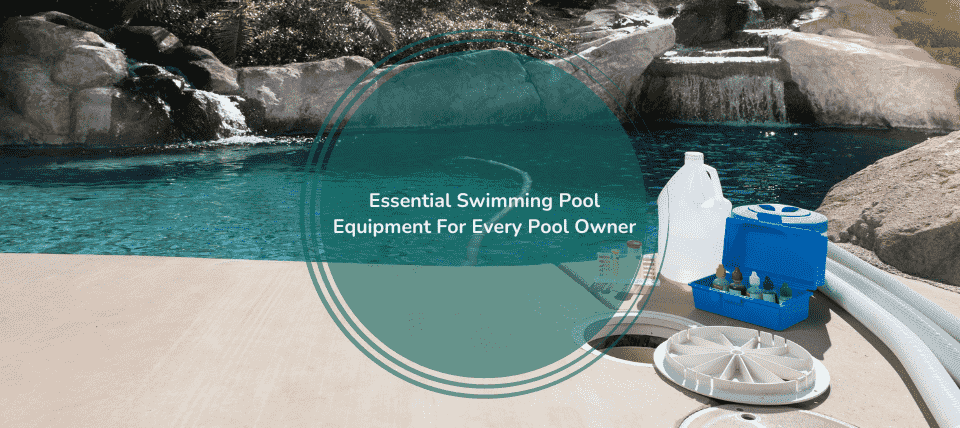to use the pool again, it’s necessary to clean it up. The best way to do this by using swimming pool equipment. Green Evolutions has compiled a list of the essential swimming pool equipment for every pool owner to help clean up a dirty pool.
Essential Pool Cleaning Tools: Keeping Your Pool Sparkling Clean
Hosting a pool party is fun, but cleaning up the mess afterward can be quite tedious. However, to use the pool again, it’s necessary to clean it up. The best way to do this is by using swimming pool equipment. Green Evolutions has compiled a list of the essential swimming pool equipment for every pool owner to help clean up a dirty pool.
The first line of defense
Pool equipment includes chemical sanitizers that are used to disinfect the pool from previous usage, parties, garbage, etc. There are various options available, such as bromine and chlorine or salt, depending on the type of pool you have. If you own a non-saltwater pool, then chlorine or bromine would be more suitable for you to use. Between the two, chlorine is more economical, while bromine is relatively expensive. However, if you own a saltwater pool, you can use salt to sanitize it.
Chemicals are often used to clean swimming pools, and one such equipment is a pH balancer. Regardless of the disinfectant used, if the pH level of the pool is not safe, it can pose a risk to swimmers. A safe pH level for a pool is typically between 7.2 and 7.8. This range allows for a more comfortable swimming experience, as it reduces the risk of aggravating any pre-existing conditions and enables swimmers to spend longer periods in the pool.
Clarifier
If you have recently sanitized your swimming pool and balanced its chemicals, but you still find it challenging to see what’s at the bottom of the pool, it may be due to the yellowish or discolored water caused by previous usage. In such a case, you can use a clarifier to improve your pool’s water clarity. Additionally, if your primary concern is the growth of algae, which can cause the water to turn green, you should consider using an algaecide to keep it under control.
If you have a pool near a tree, you may face the problem of leaves and debris falling into the water. To tackle this issue, you can use various swimming pool equipment such as a skimmer net, leaves net, pool vacuum, and a pool brush.
A skimmer net can be used to quickly remove any floating debris from the surface of the water, while a leaf net is useful for catching any organic matter before it sinks to the bottom of the pool. A pool vacuum can be either manual or robotic and is an effective tool for deep cleaning your pool. These tools will not only help keep your pool clean but also prevent damage to your pool equipment caused by clogging of debris.
Extras
It’s always better to be prepared than to regret it later, especially when it comes to maintaining your pool. Even if it may seem unnecessary at first, having certain equipment on hand can save you a lot of time and effort in the long run. For instance, a dosing dispenser and a test kit can come in handy much sooner than you may think.
A dosing dispenser is a smart investment, particularly if you don’t have anyone to attend to your pool regularly. It automatically dispenses chlorine, eliminating the need for manual monitoring. On the other hand, a test kit, whether it’s digital or manual, is an essential tool that allows you to act quickly whenever you sense that the pH balance of your pool is off. Having these items at your disposal can ensure that your pool remains clean, safe, and well-maintained, providing you with a refreshing experience every time you dive in.
Pool Liners
Swimming pools are a great source of relaxation and entertainment, and pool liners play a vital role in ensuring the safety and visual appeal of the pool. Pool liners are essential as they provide a protective layer between the pool’s concrete surface and the swimmer’s body, preventing any potential injuries. Additionally, they add to the pool’s aesthetic value by providing a decorative touch. In the market, there are primarily two types of pool liners available – each with its unique features and benefits.
Vinyl: Vinyl liners are a popular choice for pool owners due to their durability and affordability. With proper care, a vinyl liner can last between 10 to 15 years, making it a practical and cost-effective option. This is why vinyl liners are the preferred choice for many pool owners.
Fiberglass: Fiberglass and vinyl are two popular options when it comes to choosing a pool liner. Fiberglass pool liners are known for their durability and stylish look, but they come with a higher price tag compared to vinyl liners. However, the investment may be worth it for those who want a long-lasting and visually appealing pool. Fiberglass liners can withstand harsh weather conditions and last for several years, making them a popular choice among pool owners who want a low-maintenance and high-quality pool experience.
It’s worth noting that there are different types of pool liners available in the market these days. Apart from the commonly used vinyl liners, concrete liners are another option that can be customized to fit any pool size or shape. However, it’s important to keep in mind that concrete liners require more maintenance compared to other types of liners. Despite this, they remain a popular choice for some pool owners due to their durability and customizable features.
These are not all the swimming pool equipment that a pool owner would need but definitely enough to keep a pool functional. For details regarding pools, fountains, and any other water feature, connect with Green Evolutions.





